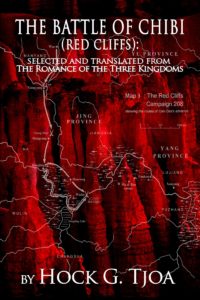Long ago, along a stretch of a river deep and wide, but far away from the  consciousness or imagination of All under Heaven (China), a battle was fought that determined the fate of its people for the next four hundred years.
consciousness or imagination of All under Heaven (China), a battle was fought that determined the fate of its people for the next four hundred years.
This book retells selections (translated by the author) from the great Chinese classic, The Romance of the Three Kingdoms. This novel combines fascinating characters in action as well as ideas in conflict, battle scenes, deception and earnest debate; there is even a marriage proposal arranged for the purpose of entrapping the Loyalist leader.
It weaves together stories, drama, poetry–events and episodes that have engrossed Asian readers and listeners for the last seventeen hundred years. Above all, the warriors and leaders in this retelling, their loyalties and conflicts, show why this classic has been valued as the best introduction to Chinese thought.
In its entirety, the Romance is a large work made up of one hundred and twenty hui, scenes or chapters, each usually with at least two dramatic episodes. It is usually published in two, three or four volumes. It is not only long but also lacks a central set of circumstances, much as a story about the Tudors would suffer in comparison with one that had the unifying focus of the personal life of Henry VIII or the achievements of the Elizabethan era.
This retelling has selected and translated the eight chapters that describe the events and discussions surrounding the Battle of Chibi (chapters 43 to 50 in the Romance); that battle is generally considered to be the tipping point of the period. To those eight, I have added eleven prior chapters that supply background to the characters and events, as well as four chapters from after the Battle that takes the story through the death of Zhou Yu, the central actor in the alliance against Cao Cao. Thus The Battle of Chibi consists of a total of twenty-three chapters.
As a translation, the goal was a readable and lively language as well as internal consistency, eliminating the most visible anachronisms (such as the drinking of tea); it does not otherwise try to correct any detail of Luo’s narrative. The ubiquitous references to the rites and rituals of welcome and departure have been somewhat reduced; a minor unrelated episode or two have been omitted as well as an occasional poem or part thereof; additions have been made to provide for smooth transitions or clearer indications of the passage of time. Many passages of the original reflect their origins as dramatic dialogue; I have tried to retain the flavor of these dialogues as they are livelier than any narrative.
The Romance is perhaps the best introduction to “Chinese thought” to be found in classical Chinese literature. It makes vivid what the Ancients wished to teach through the story of human beings rather than through the collections of sayings of sages; such texts often communicate a surreal quality, a sense of detachment from the human drama. The main outlines of Chinese social and political thought—Confucian values, Daoist influences, and Realist methods—are reflected in the Romance; it is clear that all three could be entertained in the same minds. This work has tried to capture such an overview of Chinese Thought as well as to tell the story of the battle at Chibi.
Amazon iBooks Barnes and Noble Smashwords
For those interested in learning more about Chinese history and culture, I offer three posts related to The Battle of Chibi that I wrote around 2011.
[the following is a link to a blog posted on May 30, 2012 in my blog – www.hockgtjoa.blogspot.com. It was also “published” in the Han Lin Journal of the China History Forum was a source or sustenance during my studies in Chinese history and literature. Alas, the website no longer exists today.]
Women in “The Romance of the Three Kingdoms”
[the following is a link to a blog posted on May 19, 2012 in my blog – www.hockgtjoa.blogspot.com. It was also “published” in the Han Lin Journal of the China History Forum.]
Fate and Loyalty in “The Romance of the Three Kingdoms”
[the following is a link to a blog posted on May 7, 2012 in my blog – www.hockgtjoa.blogspot.com. It was also “published” in the Han Lin Journal of the China History Forum. It offers a brief glimpse into the mind of a translator.
Excerpt from The Battle of Chibi
The Romance of the Three Kingdoms has become the source of many screen and TV adaptations. There are also video games. The following is a trailer of Red Cliff, a movie that appeared about the same time as The Battle of Chibi.